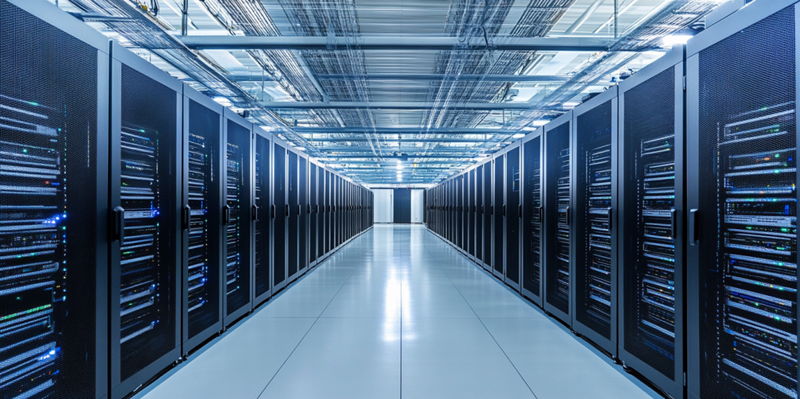As the global digital economy continues to advance at an unprecedented pace, data centers are evolving in critical ways to manage the burgeoning demand for data. India, with its rapidly increasing number of internet users, is at the forefront of this digital transformation. With 813.94 million internet users, the country’s digital footprint underscores the indispensable role of data centers in meeting escalating data needs.
Scaling Data Centers for Growing Data Volumes
Efficient Scaling to Handle Data Growth
In recent years, the digital transformation has accelerated across a myriad of sectors, prompted significantly by the pandemic. In industries such as entertainment, e-commerce, remote work, education, and banking, the demand for data has surged exponentially. Hyperscale data centers, characterized by their ability to manage the data needs of major players like e-commerce and social media platforms, have become increasingly prevalent. This expansion requires advanced storage solutions that can effectively balance the growing data volumes and manage costs efficiently.
Key to this efficient scaling is the ability to adopt innovative storage technologies. Advanced solutions, such as Western Digital’s HDDs with OptiNAND™ technology, offer optimized infrastructure needs while ensuring energy savings and reduced server counts. This technological innovation is crucial not only for handling massive data volumes but also for achieving a lower Total Cost of Ownership (TCO). As data centers grow, they must do so with a focus on both efficiency and sustainability to remain feasible in the long term.
Regulatory Compliance and Government Policies
The evolution of data centers is tightly coupled with the necessity to adhere to evolving regulatory landscapes. In India, this means aligning operations with the Data Protection Bill and CERT-In requirements, among other regulatory mandates. Government initiatives, including the significant investment of Rs three lakh crore into the data center ecosystem and targeted policies in states like Karnataka, Maharashtra, and Tamil Nadu, are critical indicators of the sector’s robust growth.
Data centers must not only comply with these regulations but also anticipate future legislative changes that may impact their operations. Building infrastructure that supports the growing digital economy while maintaining compliance is an ongoing challenge. This continuous adaptation ensures that data centers remain reliable and secure, ultimately fostering a trustful environment for digital transactions and data storage.
Managing Operational Costs and Sustainability
Operational Costs: Balancing Real Estate and Electricity
Operational cost management remains a cornerstone for the viability of data centers. Two major components of these costs are real estate and electricity. Given the energy-intensive nature of data centers, finding ways to reduce electricity consumption is a critical strategy for operational efficiency. Advanced technologies, such as higher-density HDDs, can significantly decrease the physical and power footprints of data centers.
High-density solutions not only provide additional storage capacity but also contribute to energy savings. Western Digital’s 28TB UltraSMR and 24TB CMR HDDs, for instance, offer the necessary scalability and performance required for modern data centers. These innovations enable providers to maintain high levels of service while managing costs effectively. By reducing the number of servers needed, data centers can also lower their real estate requirements, translating into substantial savings.
Sustainability as a Priority
Sustainability is no longer an optional consideration but a critical obligation for data centers. Environmental concerns are increasingly influencing how these centers are designed and operated. Transitioning to higher-density HDDs aligns data centers with global sustainability targets by diminishing both physical and power footprints. This shift helps data centers not only meet regulatory requirements but also adopt best practices in environmental stewardship.
Implementing sustainable practices involves a holistic approach that includes energy-efficient operations, the use of renewable energy sources, and designing infrastructure with a minimal environmental impact. As data demand continues to grow, the sustainability focus will become even more pronounced. Data centers that successfully integrate these practices will not only contribute to environmental conservation but will also likely enjoy long-term economic benefits from reduced operational costs and enhanced brand reputation.
Technological Innovation for Future Efficiency
Continuous Innovation in Storage Technology
Innovation in storage technology plays a vital role in the continued evolution of data centers. As the digital landscape expands, the need for scalable, efficient, and high-performing storage solutions becomes more pressing. High-density HDDs like Western Digital’s 28TB UltraSMR and 24TB CMR HDDs are examples of advancements that provide the necessary scalability and efficiency for future data center operations. These technologies allow data centers to manage ever-growing data volumes without compromising performance or efficiency.
Such innovations are essential for addressing the challenges posed by increasing data needs. By continually improving storage technology, data centers can ensure they remain capable of meeting future demands while maintaining cost control. The focus on technological advancement also fosters a competitive edge, enabling data centers to offer superior services and positioning them as leaders in the digital economy.
Adapting to Future Challenges
As the global digital economy advances at an unprecedented rate, data centers are adapting in crucial ways to handle the rising demand for data. Particularly, India is at the forefront of this digital transformation due to its rapidly expanding internet user base. With 813.94 million internet users, India’s digital landscape highlights the vital role that data centers play in meeting the increasing demand for data. These facilities not only support the growing online activities but also ensure that digital services can be delivered efficiently and reliably. As more people in India come online, the need for sophisticated and robust data centers becomes even more essential. This shift is driving investments in cutting-edge technology and infrastructure to support the country’s massive digital expansion. Data centers are evolving to become more efficient, scalable, and sustainable to cater to the explosive growth in data consumption. Their role is critical in maintaining seamless digital interactions, which are now an integral part of everyday life in India.

